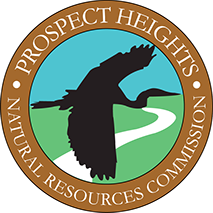Prospect Heights Natural Resources Commission
























Tuesday, September 29th 2020 - Tricia Bethke
Illinois Forest Pest Outreach Coordinator at The Morton Arboretum. 7:00- 8:30 PM
Please join us as we welcome Tricia Bethke as she presents her Nature Speaks talk, “2020 International Year of Plant Health: Protecting Plants, Protecting People”
Every year 40 percent of our agricultural crops are lost to pests, whether insect or disease, they affect the air we breathe and the food we eat. Changes to our climate and human activities have created new opportunities for pests to persist, they reduce biodiversity, alter our natural resources and agricultural systems. Plant health is necessary to protect our ecosystems and our food supply.
This program will take place as a Zoom presentation On-line.
Nature Speaks is free program but registration is necessary. A link will be sent before the talk.
In Illinois, we have over 40 known pests, but only a small percentage of them cause significant damage; Emerald Ash Borer (EAB) has killed over 13 million ash trees since 2006. The lack of species diversity and human movement of firewood allowed this pest to become a significant problem in our urban and rural areas, and reduced water and air quality as well as impacted the health of our communities.
This talk will focus on the importance of an Early Detection and Rapid Response (EDRR) plan, identify ways to keep our plants healthy while protecting our environment, spot potential forest pest threats in Illinois, and strengthen and enrich your community through plant monitoring and reporting.
Amynthas spp. also known as 'jumping worm' alters forest soil structure. Photo credit: TBethke
Invasive Asian longhorned beetle (ALB) attacks maple and cottonwood trees. Photo credit: David Coyle, Clemson University
Tricia Bethke is the Illinois Forest Pest Outreach Coordinator. Her position is funded through a cooperative grant with United States Department of Agriculture Animal Plant Health Inspection Service, USDA APHIS, and The Morton Arboretum.
Tricia’s responsibilities include statewide training of key stakeholders on the USDA APHIS Hungry Pests program for forest pest identification, high-risk pathways, regulations and quarantines, and reporting protocols. Tricia also coordinates and instructs public and private audiences on forest pest detection, tree identification and tree health monitoring.
Tricia has a Master’s of Science in Natural Resources and Environmental Sciences (NRES) from the University of Illinois.
Spotted lanternfly (Lycorma delicatula) winged adult 4th instar nymph (red body) in Pennsylvania. Photo by Stephen Ausmus.
Waltz Vineyard worked with state and federal agencies to remove and keep the invasive spotted lanternflies (SLF) fields of grapevines, grain corn, and groves free of these pests, Manheim, PA. Photo credit: USDA
Pollinators improve plant health. Photo credit: Lance Cheung,USDA